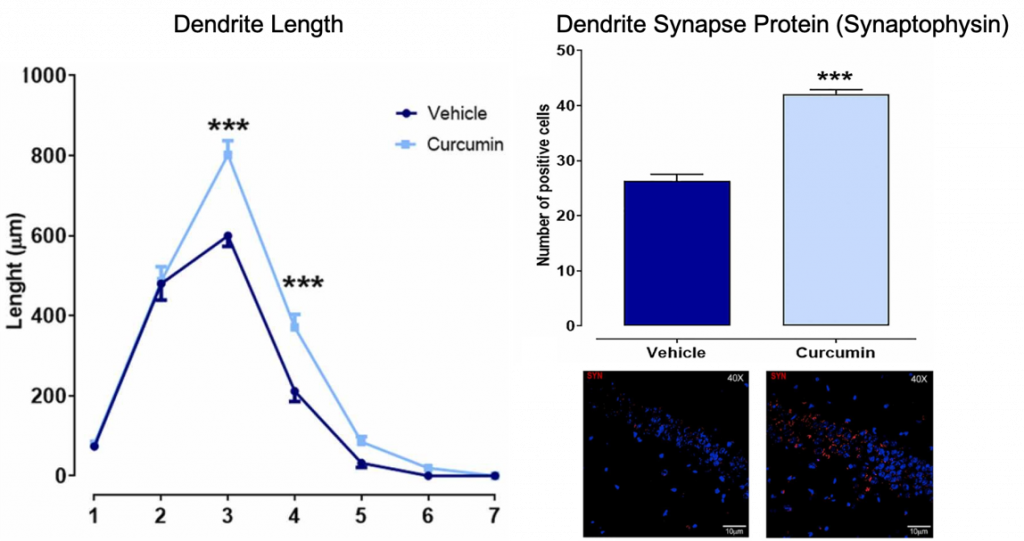Key Points:
- Curcumin treatment improves age-related spatial learning and memory deficits.
- Treatment with curcumin enhances neuroplasticity.
- Brain inflammation and oxidative stress are reduced by curcumin treatment.
If there were a region of our brain that set us apart from all other animals, it would be the prefrontal cortex. Our prefrontal cortex integrates sensory information to form our perception of reality, shaping our personality. It does this through neuroplasticity — the rewiring of neuronal connections. As we age, neuroplasticity declines, leading to cognitive impairments. However, there may be ways around this, as a new study published in the Journal of Neuroanatomy shows that a molecule found in a root restores neuroplasticity and mental impairments.
Gonzalez-Granillo and colleagues from the Meritorious Autonomous University of Puebla in Mexico report that in aged mice, curcumin induces neuroplasticity in the prefrontal cortex and hippocampus — the primary brain region involved in learning and memory. Curcumin treatment also improves learning and memory while reducing oxidative stress and inflammation. These findings suggest that curcumin, found in the commonly used spice turmeric, could be used to alleviate cognitive impairment.
Rewiring the Aging Brain to Improve Cognition
To test the effect of curcumin supplementation on learning and memory, Gonzelez-Granillo and colleagues treated aged mice with curcumin and subjected them to two commonly used memory and learning test. They found that aged mice treated with curcumin took less time to learn and remember how to escape from a water maze (Morris water maze test) and were able to learn and remember new objects (novel object recognition test) more easily. These tests demonstrated that curcumin improves learning and memory in aged mice.

The prefrontal cortex helps us modulate how we interact with the world, participating in forming memories with the hippocampus. Numerous rodent studies suggest that aging causes neuroplastic changes to the prefrontal cortex and hippocampus, namely the dendrites — structures on neurons that receive inputs from other neurons. Thus, aging seemingly disrupts connections between neurons by altering dendrites, making it difficult to form new memories based on interactions with the world.
To determine the underlying neuronal changes that occur in response to curcumin treatment, Gonzalez-Granillo and colleagues harvested and analyzed the prefrontal cortex and hippocampus of the aged mice subjected to the memory and learning test. They found that curcumin treatment induced major neuroplastic modifications, including changes to dendrites. Curcumin increased dendrite-related proteins (synaptophysin and actin), implying an increased number of neuronal connections.

Turmeric has long been used as a traditional spice and medicine, recently becoming popular in the United States for its anti-inflammatory and anti-oxidant properties. Research shows that turmeric treatment improves the short-term memory of aged rats while increasing their dendritic connections (spine density) in the prefrontal cortex and hippocampus. This is why Gonzalez-Granillo and colleagues suspected curcumin — the primary metabolite of turmeric — to have the same effects.
Indeed, the Mexican researchers observed that curcumin treatment leads to changes indicative of reduced inflammation and oxidative stress. Overall, since inflammation and oxidative stress are significant contributors to aging, this data suggests that curcumin’s anti-oxidant and anti-inflammatory effects could improve learning and memory by enhancing neuroplasticity in aged mice.
Treating Cognitive Impairment with Curcumin
Previous studies have shown that turmeric extract, which includes curcumin, can improve memory and learning. The findings of Gonzalez-Granillo and colleagues contribute to this research by showing that curcumin alone can reduce age-related cognitive decline. Additionally, in Alzheimer’s disease model mice, curcumin reduces brain inflammation, supporting the neuroprotective effect of curcumin. Thus, curcumin potentially supports neuroplasticity and helps prevent cognitive decline.
Curcumin is widley available in multiple forms, including capsules, energy drinks, and tablets. There is clincal evidence to suggests its role in treating major depressive disorder (along with the SSRI fluoxetine), post-root canal pain, and age-related physical and cogntive function, though the dosage per each treament varies. However, there are side-effects reported for turmeric, which may apply to curcumin. Excessive tumeric could trigger uterine contraction in preganancy and hinder iron absorption. Tumeric could also reduce testosterone levels and sperm movement.